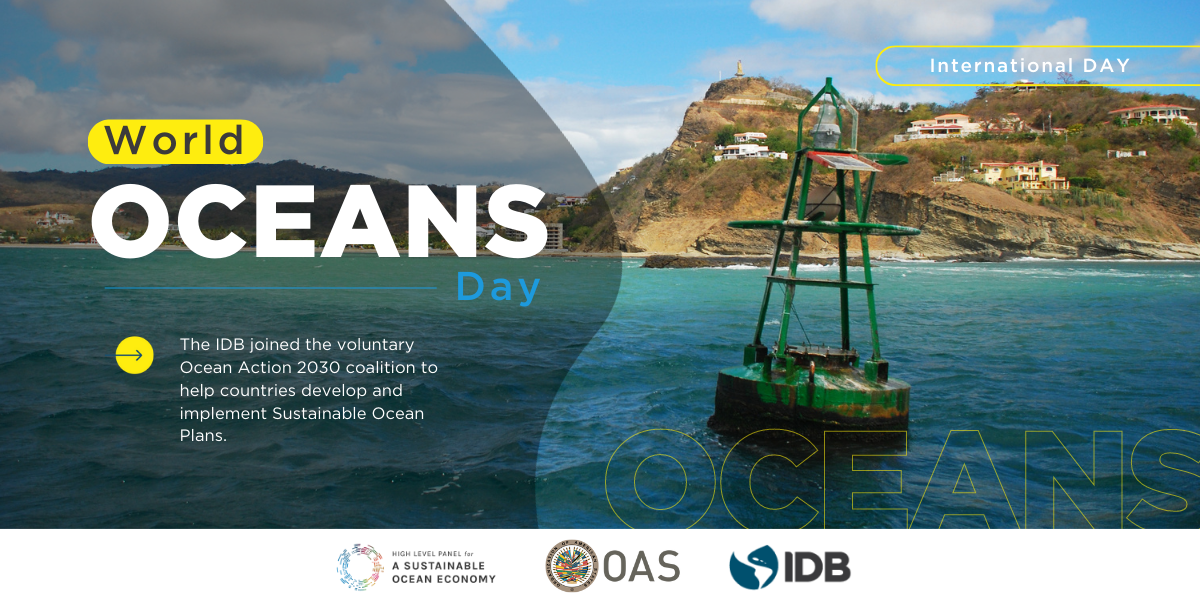Written by Raphaelle Ortiz y Cynthia Barzuna
This blog post is also available in Spanish
As part of the celebration of World Ocean Day (June 8), we remember the importance of this vital resource for our food, health, and economy.
The ocean provides us with life. It feeds us, entertains us, connects us, inspires us, and drives our success. The ocean is one of our best allies in the fight against climate change:
- It provides about 50% of the oxygen produced on Earth.
- It protects us by absorbing more than 90% of the excess heat caused by human activity worldwide and around 25% of CO2 emissions.
Our well-being depends on a healthy ocean. Pressures on the ocean are intense and growing, but recovery is possible. Putting a healthy ocean at the center of decision-making is essential for effective protection, sustainable production, and equitable prosperity.
Although the oceans often don’t receive as much coverage as wildfires, they are under constant and significant threat. The natural biodiversity of our ocean becomes more fragile every year:
- Ocean pollution: garbage patches are growing.
- Harmful algal blooms, dead zones, and fish deaths are the result of eutrophication, which begins with increased nutrient loading in estuaries and coastal waters.
- Coral bleaching
- Illegal, unreported and unregulated fishing
- Deep sea mining
Worldwide, more than 3 billion people depend on the ocean as their main source of protein and sustenance. Ecotourism, which allows communities to increase their purchasing power while protecting their environment, can only thrive in areas that have been protected from destructive human activity.
The ocean in Latin America and the Caribbean (LAC)
According to ECLAC:
- LAC waters are home to 47 of the world’s 258 marine ecoregions, more than any other region.
- More than 2 million people are directly or indirectly involved in fishing activities in LAC.
- More than 27% of the population lives in coastal areas.
- Plastics are the most important contaminant in LAC waters.
What can be done to protect our ocean?
Through various projects, the Inter-American Development Bank (IDB) supports ocean conservation in LAC, particularly through the source-to-sea approach. In the coastal areas of the Dominican Republic, the IDB is preparing a project to increase the coverage of safely managed sanitation, improve the management of drinking water services, and help strengthen INAPA operators.
The Bank also recently joined the voluntary Ocean Action 2030 coalition to help countries develop and implement Sustainable Ocean Plans, which was formed in response to the goal of the High Level Panel for a Sustainable Ocean Economy to sustainably manage 100 % of ocean areas under the national jurisdictions of member countries by 2025.
As a member of Ocean Action 2030, the IDB provides technical and financial assistance to help countries overcome the challenges that stand in the way of greater adoption of Sustainable Ocean Plans.
A Sustainable Ocean Plan is inclusive, integrative and iterative in terms of stakeholder engagement and knowledge use. In terms of content, it is based on location, ecosystem, and knowledge. In terms of impact, it is endorsed, financed, and training-based to ensure its implementation.
Useful components of an effective Sustainable Ocean Plan include spatial plans, economic development strategies, environmental protection approaches, social considerations, ocean environmental accounts, supporting policies, and finance. While the destination – a sustainable ocean economy – can be shared, ports of departure and charted courses may differ between countries.
A Sustainable Ocean Plan provides a framework to reconcile the conflicting uses of the ocean and its resources. It enables long-term sustainable growth in the ocean economy. It must be in line with the 2030 Agenda, based on integrated ocean management and ecosystem knowledge, address all terrestrial and marine pressures, and take into account the expected impacts of climate change.
In close alliance with the IDB, the Organization of American States (OAS) supports these efforts by being at the forefront of the design, development, and management of initiatives to strengthen cooperation mechanisms among member states for sustainable water management across borders. The OAS is also on its way to becoming a member of Ocean Action 2030 to support the adoption of Sustainable Ocean Plans through regional policy dialogues.
These international associations help countries manage water resources comprehensively, considering their effects on the ocean. They also allow them to coordinate activities and ensure that the burden does not fall on just one country. With access to financial and technical support, they can scale up their ocean conservation efforts. This not only protects the livelihood of millions, but also improves the health of our planet.
Find out more about ocean conservation in LAC:
- Ocean Action 2030: Supporting countries with Sustainable Ocean Plans
- Prospects for the Oceans, Seas and Marine Resources in Latin America and the Caribbean
Guest Authors
Raphaelle Ortiz is a research consultant for the Organization of the Americas (OAS). She works on publications, blogs, and other research products. She has a BA in Global Environmental Change and Sustainability from Johns Hopkins University and an MPA in Environmental Science and Policy from Columbia University.
Cynthia Barzuna is the Director of WRI’s Ocean Action 2030. Ocean Action 2030 is a voluntary coalition dedicated to supporting countries in their goal of building a sustainable ocean economy by developing and implementing Sustainable Ocean Plans.


Leave a Reply